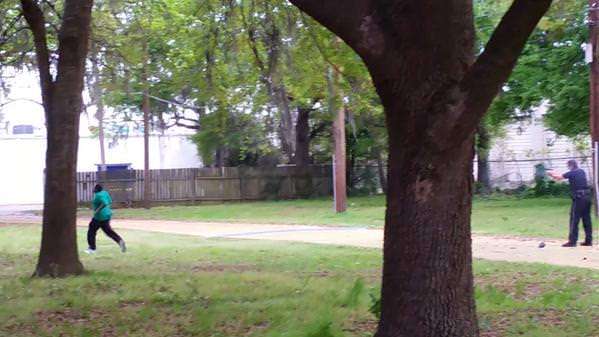The Shooting of Walter Scott and the Right to Record Cops
Feidin Santana was exercising a constitutional right that police often violate.

Feidin Santana, the bystander who witnessed the police shooting of Walter Scott in North Charleston, South Carolina, on Saturday, showed real courage in using his cellphone to record the event, even before it became clear that he was watching what local authorities describe as a murder. Although the First Amendment right to record the police as they perform their duties in public is well established, that does not necessarily mean cops will respect it, as The New York Times notes:
Cellphone videos taken by bystanders tend to make many police officers uncomfortable, because they have no control over the setting and often are not even aware they are being filmed until later. Though the courts have held that people have a constitutional right to record the police, those who do are frequently challenged by officers.
The Times cites a case described in the Justice Department's recent report on police practices in Ferguson, Missouri: "a traffic stop in which a Ferguson officer told the driver's 16-year-old son not to videotape him." The officer ultimately "wrestled the phone away from the teenager, and everyone in the car was arrested 'under disputed circumstances that could have been clarified by a video recording.'" Such incidents are familiar to Reason readers, and they often end with trumped-up charges such as interfering with police, disorderly conduct, or (my favorite) resisting arrest.
Because so many cops still don't get it (or get it but don't care), it is worth emphasizing at every opportunity that the right to record police is not some wacky, newfangled legal theory. It has been explicitly upheld by at least four federal appeals courts—in the 1st, 7th, 9th, and 11th circuits—and implicitly recognized by others. Federal judges outside of those four circuits have ruled that the right to record flows logically from other First Amendment rights, especially the right to gather information, and that it applies equally to all citizens, not just credentialed journalists.
Last July, for example, a federal judge in Texas, which is part of the 5th Circuit, ruled not only that the First Amendment protects the right to record police officers but that the right is well established enough that cops can be held personally liable for violating it. U.S. Magistrate Judge Mark Lane cited "a robust consensus of circuit courts" that "the First Amendment encompasses a right to record public officials as they perform their official duties." Although the 5th Circuit had not directly addressed the issue, Lane said, in two of its decisions it "seems to assume, without explicitly stating, that photographing a police officer performing his official duties falls under the umbrella of protected expression."
Police chiefs in cities such as New York and Washington—in the 2nd and D.C. circuits, respectively—take it for granted that "members of the public are legally allowed to record police interactions," as a 2014 NYPD memo put it, and that "a bystander has the same right to take photographs or make recordings as a member of the media," as D.C. Police Chief Cathy Lanier informed her officers in 2012. The positions taken by these departments are encouraging, but the fact that such memos are still necessary is not.
Even the prospect that cops who arbitrarily stop people from recording them cannot rely on qualified immunity may not be much of a deterrent, since taxpayers generally pick up the tab when cities settle these cases. According to a federal lawsuit filed last year, one of the NYPD officers who busted an activist for taking pictures of a stop-and-frisk encounter in 2012 (the charge: disorderly conduct) told him, "Now we are going to give you what you deserve for meddling in our business, and when we finish with you, you can sue the city for $5,000,000 and get rich. We don't care."


Show Comments (26)